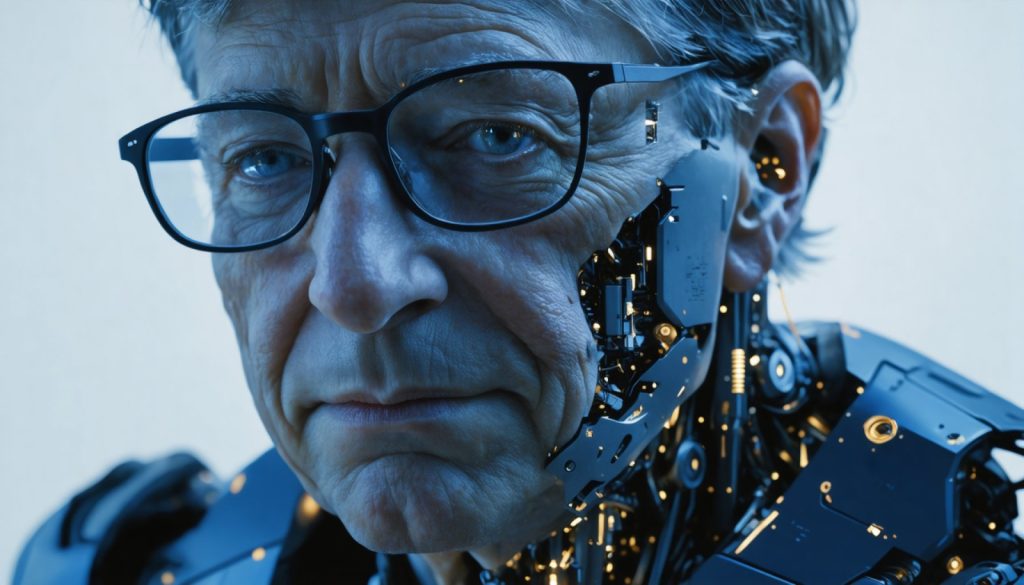
- Bill Gates envisions AI’s advancement reducing the workweek to two days within a decade, reshaping labor dynamics.
- AI is poised to revolutionize sectors like medicine and education, providing sophisticated, accessible services.
- This shift could alleviate resource constraints, particularly in fields experiencing talent shortages.
- Gates stresses the importance of preparing the workforce for a future driven by creativity and innovation.
- While AI might transform industries, human-focused activities will persist, reflecting the need for balance.
- The AI revolution promises enhanced quality of life, urging responsible, ethical integration for societal benefit.
Picture a world where the typical workweek is not five grueling days but merely two. As one of the most iconic figures in technology, Bill Gates is no stranger to transformative predictions. He imagines a future shaped powerfully by artificial intelligence—an era marked by sweeping changes in how we live and work. Gates predicts that AI’s relentless march towards automation could slash the workweek to just two days within a decade, fundamentally altering our approach to labor.
Blazing a path through professions revered for their human touch, AI stands poised to transform the realms of medicine and education first. Gates envisions a landscape where automated systems deliver accessible, sophisticated medical advice and empathetic, effective educational tutoring at the click of a button. He portrays a digital panorama where AI frees society from resource constraints, easing burdens in sectors where talent shortages are acutely felt, such as among doctors and mental-health professionals.
Yet, the vision Gates paints is not devoid of contemplation. His musings carry an optimistic yet cautious tone, pondering whether the workforce should prepare for a world of reduced work commitments. He suggests a society pivotal on creativity and innovation, driven by novel ways of thinking heralded by AI’s presence. However, he softly warns of unknown territories AI might open up, urging thoughtful consideration and planning.
This brave new AI-driven world isn’t confined to hypothetical scenarios. Gates recalls the excitement around early iterations of systems like ChatGPT, urging us to consider how these digital prodigies will redefine numerous facets of life. Manufacturing, logistics, and food production might soon be domains of lesser human involvement, solved through smart algorithms and artificial insight.
Indeed, Gates is not sweeping human activity entirely under the digital rug. He notes that certain pursuits, particularly those celebrated for their human essence—like professional baseball—will remain within the ambit of human effort and enjoyment. These insightful reservations underline the balance those leading the technological revolution must maintain.
As we stand on the precipice of an AI revolution, the promise of a two-day workweek tantalizes us with visions of enhanced leisure and a life redefined by opportunity. Yet, with this allure comes the responsibility to harness AI ethically and equitably. Gates’s foresight invites us to set sights on a future where technology doesn’t just automate but augments—extending the reach of human potential and enriching the fabric of our everyday lives. In this, we find our message to hold close: innovation, guided wisely, should reflect our shared values and lead to a more prosperous society for all.
AI’s Two-Day Workweek Dream: How It Can Reshape Our Lives
Understanding Bill Gates’s Vision of a Two-Day Workweek
Bill Gates’s forecast highlights a future where artificial intelligence (AI) significantly reduces the typical workweek to just two days. This radical change, expected within a decade, centers on AI’s influence in automating tasks across various sectors. By easing the workload, AI promises more time for creative and innovative endeavors.
Exploring AI’s Potential in Key Industries
1. Medicine and Education
AI’s potential to transform medicine and education is profound. In healthcare, AI could:
– Automate Diagnosis: AI algorithms can quickly analyze medical images and data, providing faster and often more accurate diagnoses than human professionals.
– Deliver Remote Healthcare: Telemedicine platforms driven by AI could ensure widespread access to expert health advice, especially in underserved regions.
In education, AI-powered tutoring systems could offer:
– Personalized Learning Experiences: AI algorithms tailor educational content to individual learning styles, improving student outcomes.
– 24/7 Access to Resources: Students gain round-the-clock access to learning tools and support, fostering continuous learning outside traditional classroom settings.
2. Manufacturing and Logistics
AI and automation are poised to revolutionize manufacturing and logistics through:
– Smart Factories: Utilizing AI for predictive maintenance and real-time monitoring can enhance efficiency and reduce downtime.
– Automated Supply Chains: AI can optimize logistics, reducing human error and cutting costs while speeding up delivery times.
AI’s Role Beyond Automation
Creativity and Innovation
As AI takes over repetitive and data-driven tasks, people will likely focus more on creative and innovative pursuits. Here’s how:
– New Professions: New roles focusing on interaction with AI technologies and creative solutions to complex problems may emerge.
– Enhanced Collaboration: Collaboration tools powered by AI could enhance teamwork, leading to innovative outcomes across disciplines.
Controversies and Limitations
Despite these opportunities, AI’s integration poses challenges:
– Job Displacement: There’s a risk of increased unemployment as AI takes over jobs traditionally performed by humans.
– Ethical Concerns: AI use raises questions about privacy, data security, and its ethical applications.
Recommendations for a Two-Day Workweek Transition
1. Upskill Workforce: To mitigate job displacement, invest in continuous learning and skill development programs focused on AI and technology.
2. Develop AI Ethics Frameworks: Establish guidelines ensuring AI development aligns with ethical standards and societal values.
3. Encourage AI Research and Development: Foster environments that support AI innovation, balancing technological advances with human-centric approaches.
Conclusion: Preparing for an AI-Enhanced Future
The promise of a two-day workweek brings the potential for enhanced leisure and increased quality of life. However, as Gates underscores, approaching AI integration with caution and forethought is crucial. By ensuring AI development aligns with ethical principles and supports societal well-being, we can embrace this future responsibly.
For more insights into AI advancements and their potential impacts, visit the Microsoft website for updates directly from industry leaders.



